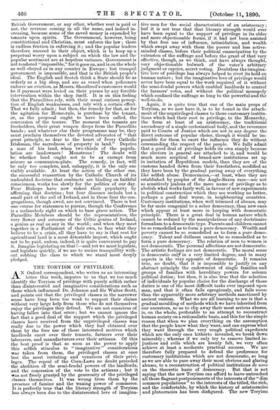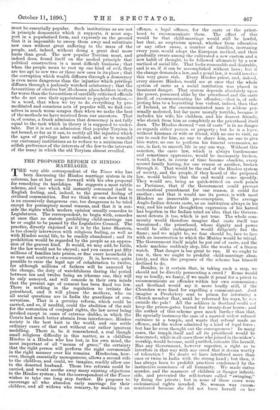THE TORYISM OF PRIVILEGE.
AN Oxford correspondent, who writes us an interesting letter this week, imputes to us that we too much identify the Toryism of privilege with purely selfish rather than disinterested and imaginative considerations such as those which influenced Dr. Johnson and Sir Walter Scott, and points out that the privileged classes in the narrower sense have long been too weak to support their claims without very large help from those who do not themselves enjoy the privileges they defend. We are not conscious of having fallen into that error ; but we cannot ignore the fact that a good deal of the support which the privileged classes have received from the unprivileged classes was really due to the power which they had obtained over them by the free use of those interested motives which landlords exert over their tenants, farmers over their labourers, and manufacturers over their artisans. Of this the best proof is that so soon as the power to apply this selfish stimulus to " imaginative " considerations was taken from them, the privileged classes at once lost the most irritating and vexatious of their privi- leges. The repeal of the Corn-Laws no doubt preceded the abolition of the semi-feudal powers of the landlords, and the concession of the vote to the artisans ; but it was not freely granted by the generosity of the privileged . classes themselves. It was wrung from them by the presence of famine and. the waxing power of commerce. It is perfectly true that the literary strength of Toryism has always been due to the disinterested love of imagina- tive men for the social characteristics of an aristocracy ; but it is not true that that literary strength would ever have been equal to the support of privilege in its older and more objectionable forms, if it had not been assisted by that free use of influence, intimidation, and wealth which swept away with them the poorer and less active- minded classes, before their political emancipation by the extension of the suffrage and before the grant of that very effective, though, as we think, and have always thought, very objectionable bulwark of the voter's arbitrary judgment or caprice, secret voting. Doubtless the imagina- tive love of privilege has always helped to rivet its hold on human nature ; but the imaginative love of privilege would never have been equal to the work required of it without the semi-feudal powers which enabled landlords to control the farmers' votes, and without the political monopoly which confined the suffrage BO long to the powerful and the well-to-do.
Again, it is quite true that one of the main props of Toryism, as we now have it, is to be found in the attach- ment of the unprivileged classes to those customary institu- tions which had their root in privilege, to the Monarchy, the form at least of an aristocracy, the traditional ascendency of a single ecclesiastical body, and the reverence paid to Courts of Justice which are not in any degree the direct outcome of popular choice, though it would be im- possible for them to exert the influence they do without commanding the respect of the people. We fully admit that a good deal of privilege holds its own simply.bec,ause the electors in general are attached to it, and would be much more sceptical of brand-new institutions set up in imitation of Republican models, than they are of the customs handed down from their forefathers, modified as they have been by the gradual paring away of everything like selfish abuse. Democracies,—at least, when they are established by. peoples of the Anglo-Saxon race—are not so sensitively Jealous of the mere name of privilege as to abolish what works fairly well, in favour of new experiments in political construction which they see working no better, perhaps a good deal worse, in neighbouring countries. Customary institutions, when well trimmed of abuses, may be far more congenial to a sober democracy, than new ones which appear at least more in keeping with democratic principle. There is a great deal in human nature which cannot be reduced by the manipulations of any doctrinaire formalism to a democratic type. Parents and children cannot be so remodelled as to form a pure democracy. Wealth and poverty cannot be so remodelled as to 'form a pure demo- cracy. Talent and dullness cannot be so remodelled as to form a pure democracy. The relation of men to women is not democratic. The personal affections are not democratic. The artistic feelings are not democratic. The moral sense is democratic only in a very limited degree, and in many aspects is the very opposite of democratic. It remains true, no doubt, that it is impossible to justify on any abstract principle the endowment of single families and groups of families with hereditary powers for solemn political duties ; but then, it is also true that the selection of individuals by popular choice for the discharge of those duties is one of the most difficult tasks ever imposed upon man, and that it often fails egregiously, and fails worse than the apparently more arbitrary methods sanctioned by ancient custom. What we are all learning to see is that a gradual moulding of methods which we have inherited, from our ancestors, so as to clip away their most serious abuses, is, on the whole, preferable to an attempt to reconstruct human society on a rationalistic basis, and this for the simple reason that when we plan everything on the assumption that the people know what they want, and can express what they want through_ the very rough political expedients which are the only ones hitherto invented, we break down miserably ; whereas if we only try to remove limited in- justices and evils which are keenly felt, we very often achieve at least a moderate practical success. We are therefore fully prepared to defend the preference for customary institutions which are not democratic, so long as we are able to pare away their most obvious and glaring abuses, to a reconstruction of political institutions de novo on the theoretic basis of democracy. But that is not saying that the new Toryism can afford to leave untouched all those flagrant postponements of the interests of the "dim common populations" to the interests of the titled, the rich, and the comfortable, by which the history of aristocracies and plutocracies has been disfigured. The new Toryism must be essentially popular. Such institutions as are not in principle democratic which it supports, it must sup- port in a popularised form, and expressly on the ground that it is impossible to sweep them away and substitute new ones without great suffering to the mass of the people, and, indeed, without doing a great deal more harm than good. The new popular Toryism must, and indeed does, found itself on the modest principle that political construction is a most difficult business ; that when the people mean to root up one kind of evil, they are too apt to sow two or three new ones in its place ; that the corruption which wealth diffuses through a democracy is even more dangerous than the injustice which privilege diffuses through a jealously watched aristocracy ; that the favouritism of elective but ill-chosen place-holders is often far worse than the favouritism of carefully criticised officials who do not owe their appointment to popular election,— in a word, that when we try to do everything by pre- meditated and conscious acts of popular will, we find our- selves in much worse scrapes than when we make the best of the methods we have received from our ancestors. That is, of course, a frank admission that democracy is not fully equal to the task which in theory it is supposed to under- take. But it is not an admission that popular Toryism is not bound, so far as it can, to rectify all the injustice which the ages of privilege have endorsed, and so to remodel our customary institutions as to reduce to a minimum that selfish preference of the interests of the few to the interests of the many in which the old Toryism almost revelled.



















































 Previous page
Previous page